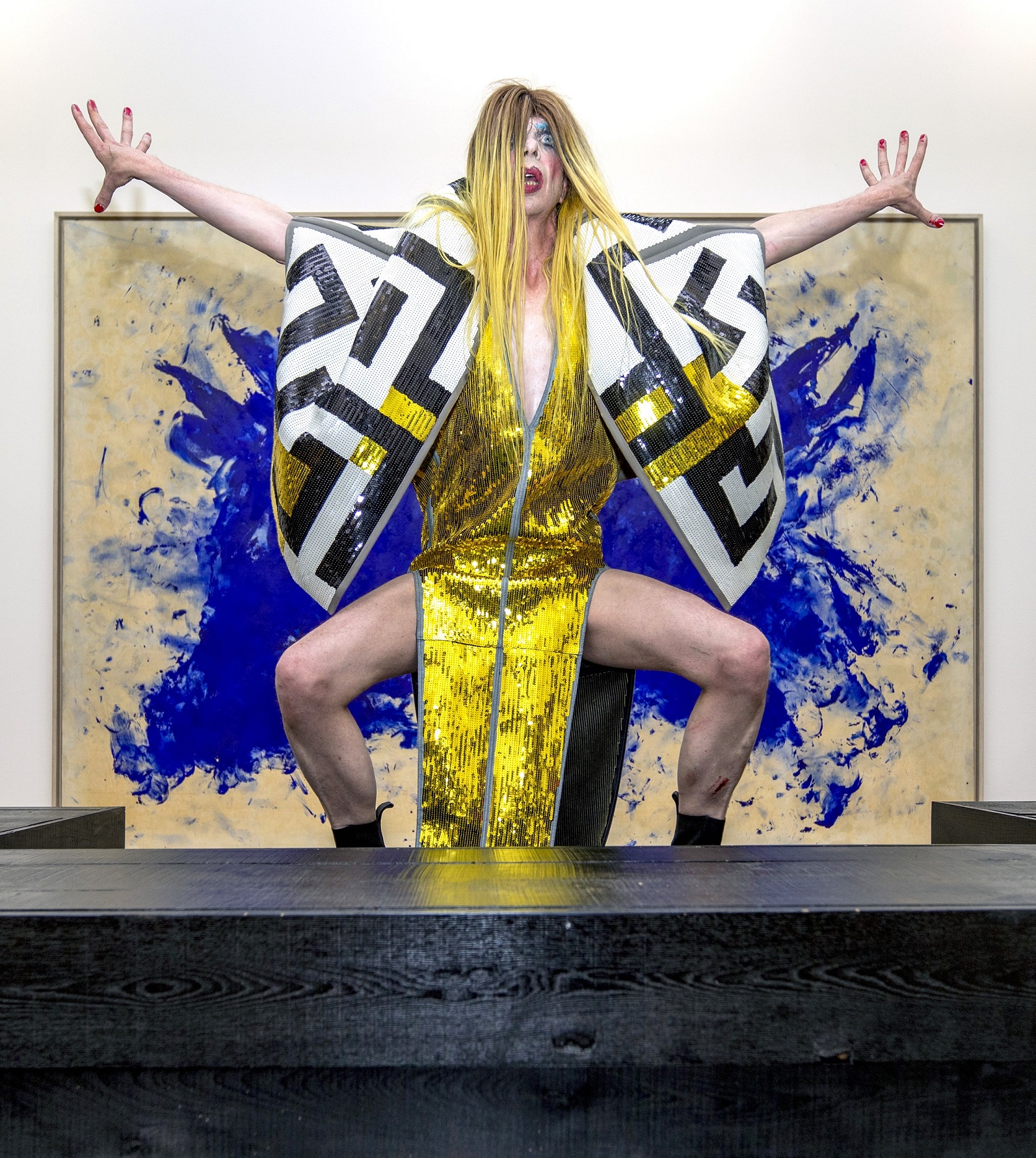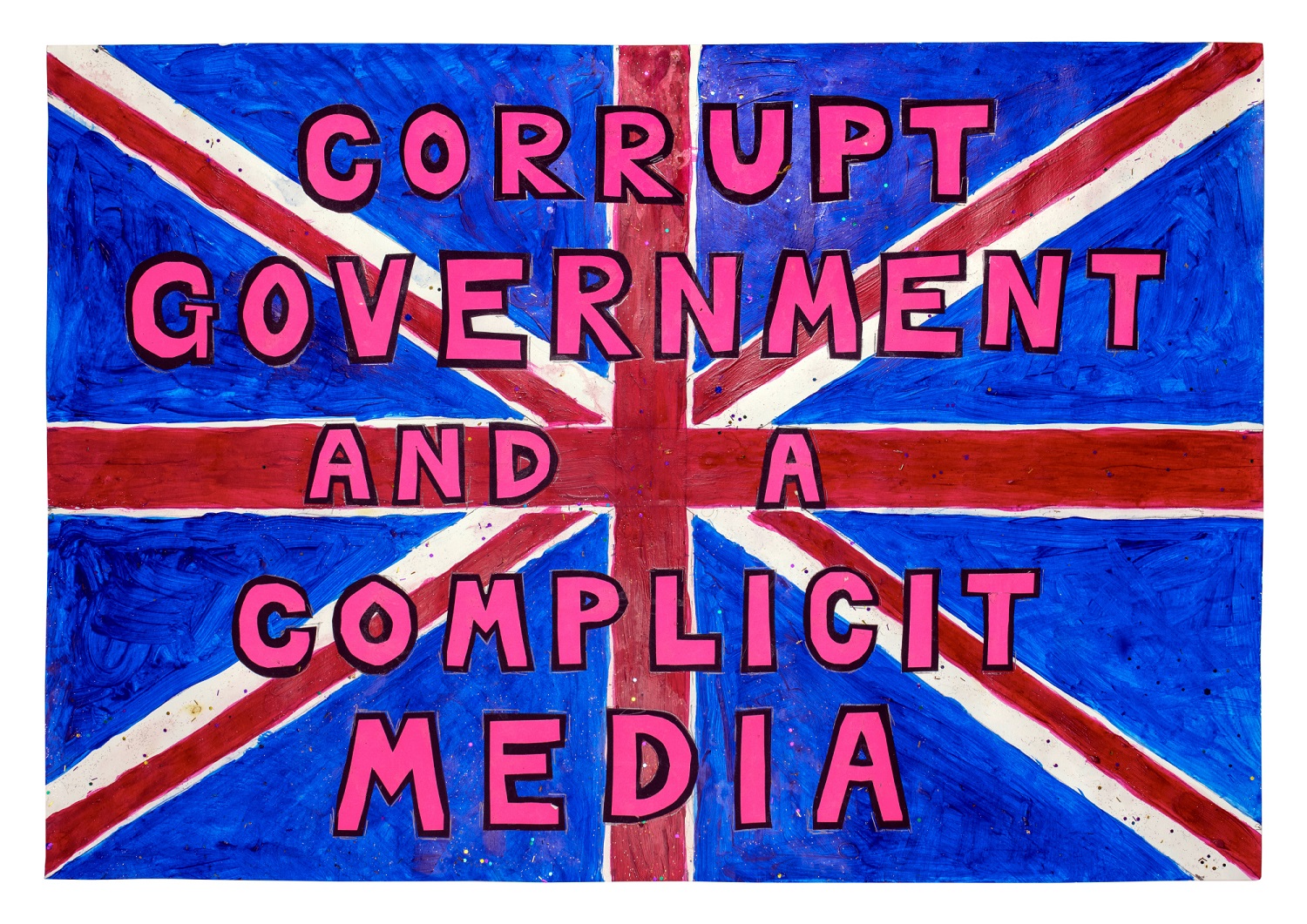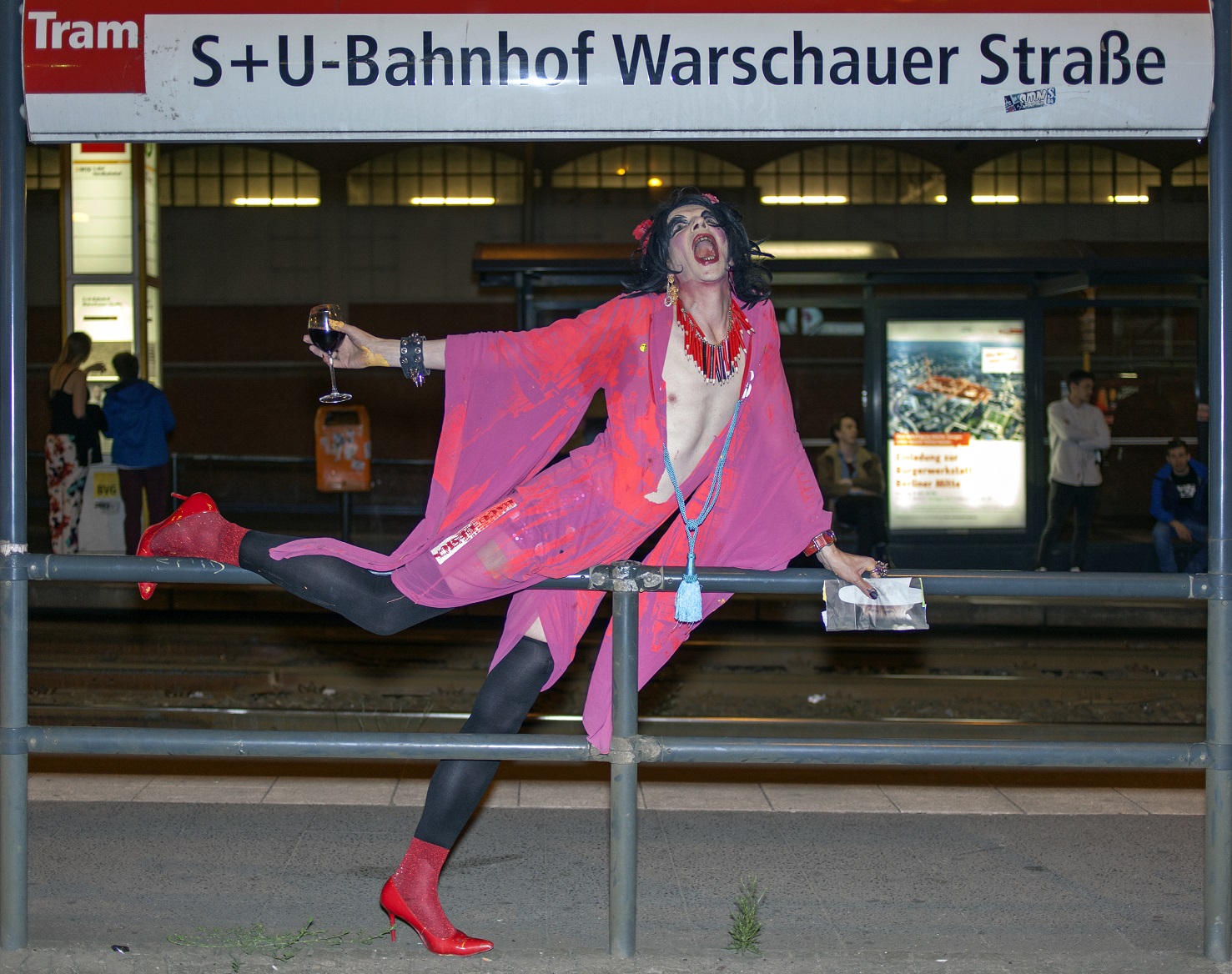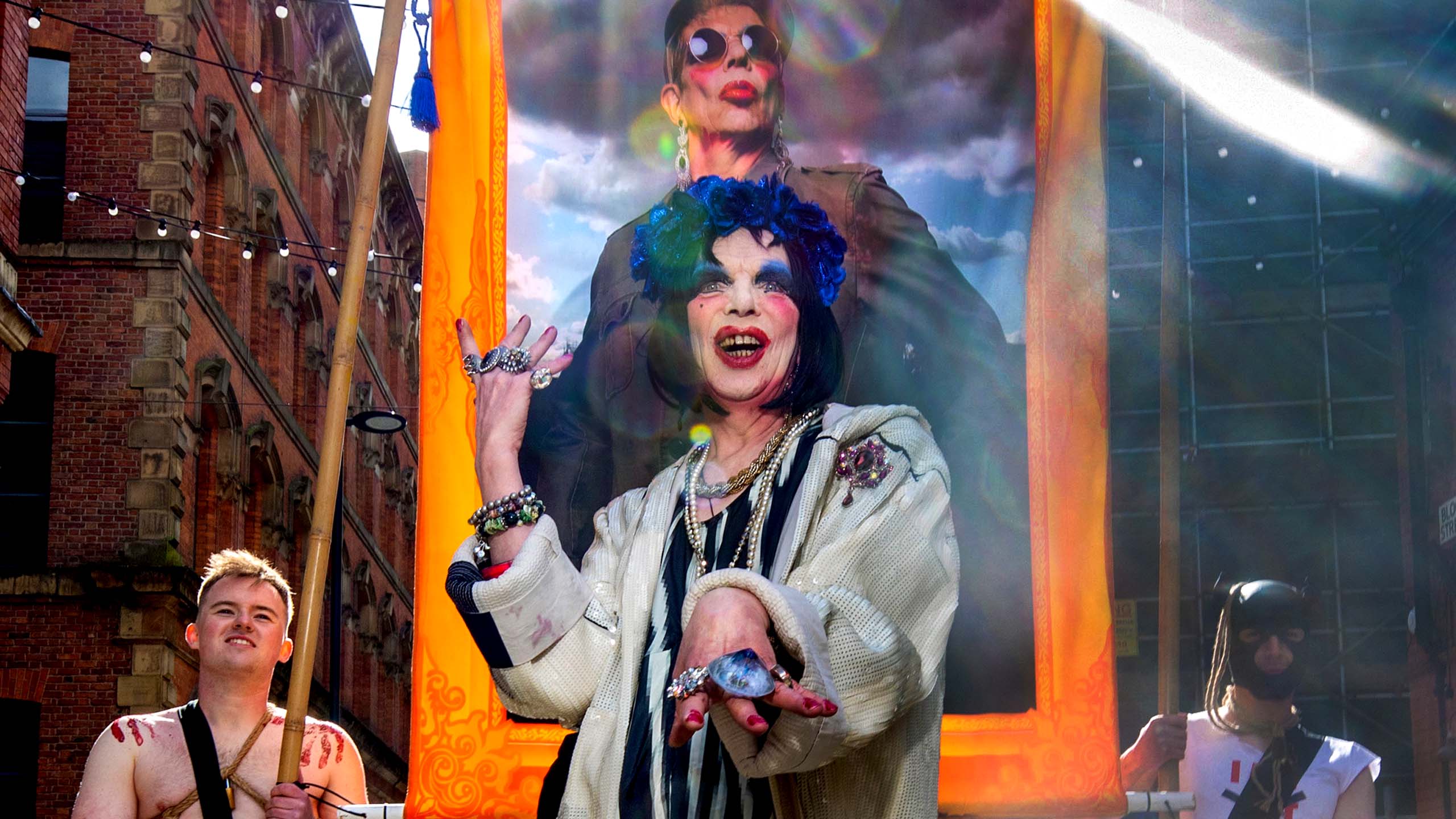David Hoyle tells me he’s still fuelled by anger, but I’m not sure if I believe him.
Not because of how polite the legendary U.K. performance artist is during our conversation; good manners are an excellent mask for rage. And despite his graciousness (he apologizes repeatedly for not knowing more Canadian queer artists), Hoyle can quickly turn on a rant. “Spiteful, nasty, peevish, judgmental and vile,” is how he describes his church-oriented upbringing in Blackpool, a town on the northwest coast of England. He never has to wrack his brain for phrases like “absolutely hopeless,” “toxic masculinity,” “suicide-inducing” or “downward spiral.”
He’s still throwing punches. It’s just that these days he’s less inclined to punch himself and those around him. Hoyle, after a lifetime as an underground drag-inflected performer and artist, seems to have a newfound confidence. After so many years as a struggling outsider, a welcoming space in the culture—in Britain and across Europe—has been opening up for him. Approaching his 60th birthday in September, he’s being treated like he’s got some wisdom, like he deserves some respect—and maybe it’s starting to sink in.
Of course, he’s built up a devoted fan base since he started out performing in the clubs and then gained a certain kind of niche national notoriety as Divine David on two seasons of The Divine David Presents on Channel 4 in 1998 and 2000. He’d appear in trademark messily applied makeup, hurricane-coiffed wigs and torn, dirty dresses, demonstrating how to decorate a Christmas tree with various pork products, musing about people being killed and mutilated by the side of a canal or tearing up a newspaper to make a theoretically fashion-forward waistcoat. Think Drew Droege’s Chloe, but on acid that’s been soaked in swamp water. Or a Rick Mercer rant, but as an apocalyptic fever dream in a lesser-known circle of hell. Hoyle’s look might employ wardrobe and makeup traditionally considered feminine, but he’s not impersonating any gender—or not least not any gender of this world.

Credit: Lee Baxter
When London’s new Queer Britain museum opened this spring, it was Hoyle’s portrait, painted by London artist Sadie Lee, that first greeted visitors at the inaugural exhibition. In March, in a ceremony at the Manchester Art Gallery, the Manchester Sisters of Perpetual Indulgence, a charity, protest and street- performance organization whose members dress as nuns, canonized him as Saint David of the Avant-Garde, making him the first English saint canonized by the sisters since the late filmmaker Derek Jarman was anointed Saint Derek of Dungeness in 1991. Last year he played the drag mother in the film Everybody’s Talking About Jamie and over the last year or so, Hoyle’s appeared in a series of shows at London’s Royal Vauxhall Tavern and Manchester’s The Lowery and Brighton’s Spiegeltent. In June, he performed as a special guest at Pride in Skopje, North Macedonia—his second appearance there—and will perform this summer in Norway and France. There’s been increased interest in his visual artwork, which has the belligerent colours, politics and temperament of a protester in Margaret Thatcher’s ’80s-era U.K. The iconoclast has become, dare I say, an icon.
“I feel I’ve got a bit of a presence, and that’s very nice,” Hoyle tells me by phone from his home in Manchester. “I do feel very honoured at the moment.”
Needless to say, it hasn’t been easy. When Hoyle was 24, with his liver failing because of heavy drinking, he could have never imagined making it to 60. Performing as Divine David, he’d go on stage at clubs and inject himself with drugs, not knowing what they were, and let the audience watch as his high played out before their eyes. He pushed himself so hard that he needed to take six years out of the spotlight, starting around the year 2000. When Hoyle returned to performing, he was no longer Divine David, but David Hoyle. Just as much an edgy anti-capitalist and anti-establishment freedom fighter, but not so self-destructive.
“I didn’t think I’d live this long. It’s a bit of a surprise to me that this has happened. I must be a medical miracle,” Hoyle says.
“Having worked with a lot of young people, I’ve been very lucky. To be with these amazing artists, it gives me hope.”
The break did what it needed to do. He survived. But even over the last decade or so, long after abandoning Divine David, you can still see Hoyle maturing as a performer and as a person. In a 2009 performance at Royal Vauxhall Tavern, for example, his monologue riffs on self-entitled young people: “I was born and brought up and the rest of it, and abused, by very small-minded people who were more worried about what the neighbours thought than nurturing,” he tells his audience. “You 20-year-olds, from your middle-class backgrounds, where your parents are saying, ‘Look, if needs be, I’ll guide his cock up your ass,’ some of us from a certain generation never had that luxury, get me?… I love the fact that there are 20-year-old cunts out there in the world living their stupid, self-obsessed, superficial lives when people went through real hell and had to fight for you to be as complacent as you are.”
These days, though, Hoyle has nothing but good things to say about the young, and no longer believes in the generation gap he complained about in that monologue. “I think there’s quite a healthy intergenerational happening that’s going on. I think a lot of young people understand that without the freedom fighters of the past, they wouldn’t have some of the freedoms that they have now. I feel like I’m part of a continuum. I think of characters like Quentin Crisp, and then you think about the Gay Liberation Front, which was before my time. Now you’ve got wonderful young people—drag kings, wonderful trans artists—who are bringing new aspects of life to consciousness and making people think,” he says. “Having worked with a lot of young people, I’ve been very lucky. I’ve worked with people like [performance artist] Travis Alabanza and [choreographer/dancer] Joshua Hubbard. To be with them, these amazing artists, it gives me hope.”

Credit: Lee Baxter
In fact, younger people championing non-binary identities have helped Hoyle put his finger on his own identity as non-binary, something he had been struggling with since he was a child. “I’ve never felt like a boy. I had no interest in traditional boy things like football and sports. I’ve always been more artistic,” he says. “But we didn’t have the words when I was younger. I’m very proud of all the different phrases people are now using. And it’s not just members of the LGBTQ+ community who are using these new ideas to define who they are. It’s for everybody. You have people who would have fallen into the heteronormative—what’s the word?—demographic thinking how heteronormative are they really. That’s very interesting.”
This optimism about the next generation remains in tension with his ongoing frustrations with previous generations. On one hand, Hoyle sees no escape from so many of the distressing global political situations: the mendacious buffoonery of U.K. prime minister Boris Johnson’s Conservative government, Russia’s invasion of Ukraine, hateful reactionaries in the United States, the rise of authoritarian-minded leaders around the world. On the other, he believes that art, especially laughter, provides not only an escape, but a way of getting at our problems.
“When I was about eight years old, I remember my grandma asking me, ‘What do you want to do when you grow up?’ I said, ‘I’d like to be a comedian.’ And she said, ‘Why?’ And I said, ‘Well, I just like it, you know, I just want to make people laugh.’”
Hoyle’s idealism and philosophical bent have perhaps prevented him from becoming a conventional comedian and finding mainstream success. “To make it in our society, that’s really the world of Tuscan villas and infinity pools,” he says. “That is not my reality. I live in a housing-association flat that’s very neglected and not particularly inspiring.”
Instead, he puts his comic impulse to use as a vessel for shaking up society, to make the powerful, not the downtrodden, the butt of the joke. To this day, his shows are mostly improvisational. On the train ride from Manchester, where he lives, to London, where most of his gigs are, he’ll think about what he’d like to say, but rarely locks anything down. “It’s spontaneous. What I do is just feed off the energy in the room. I will have certain topics and subjects that I want to talk about or express or acknowledge. I pepper the evening with those topics that concern all of us, but the majority of the show is improvised,” he says. “I’ve been doing it for so long, that all comes from experience.”

Credit: Lee Baxter
Though Hoyle has gone all-in on his life as an artist, he does wonder if art and comedy are enough to heal the world in its current state of agitation.
“What I believe really what we need is a mass lifting of consciousness globally to mutual love and respect, to try and transcend all the nonsense that the media and our various so-called governments project on to us and go to another level,” he says. “I’ve always thought it might be nice if we all took a natural hallucinogen at exactly the same time globally. Then just see what happens. We need something that will bring us together, raise our consciousness and make us question all the things that are presented to us as being solid and organized and forever.”
David Hoyle performs at The Cockatoo at Bethnal Green, London, on Fri., July 22


 Why you can trust Xtra
Why you can trust Xtra


